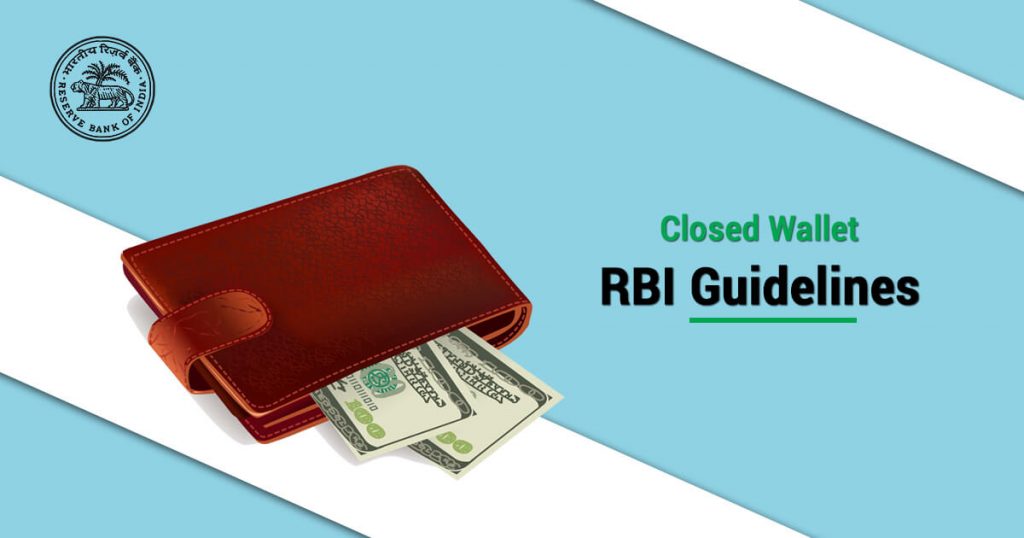What are the Closed Wallet RBI Guidelines?

Dashmeet Kaur | Updated: Nov 04, 2019 | Category: Prepaid Wallet, RBI Advisory
On 16 October, the Reserve Bank of India (RBI) issued new guidelines to allow interoperability for closed wallets. It is a prominent move from RBI’s side that enables a seamless transfer of funds amidst numerous mobile wallets like PhonePe and Paytm. The new guidelines stimulated companies and created an equal opportunity for closed wallets which operate without payments banks and payment bank licenses. The mobile wallet interoperability seems to be a significant upgrade that would facilitate a smooth transaction between the users of different wallet companies. However, soon after the issue of RBI guidelines, payment banks that possess the license to drive digital payments in India feel a sense of threat for their business. It results in the starting of an undeclared war among the payment banks and mobile wallet companies.
Since over 49 non-bank mobile wallet companies in India are struggling to sustain a position in the market, the RBI new norms provide act as a ray of hope. As per the Credit Suisse report, India’s e-payment ecosystem shall flourish at a rapid pace with an estimated growth of five times to $1 trillion by the year 2023.
Browse through our articles on services provided at Swarit Advisors, and just let us know if we can help you with your NBFC registration or NBFC for Sale or RBI Advisory Services.
Table of Contents
A brief about the Closed Wallet
The wallet which a company issues to the customers for purchasing goods and services exclusively from that company is known as a closing wallet or e-wallet. The closing wallets do not permit cash redemption or withdrawal. Many prevalent E-commerce websites such as Jabong.com, Makemytrip.com, and Flipkart.com offers closed wallet. A closed wallet is a potent device for gaining client’s faith by providing them rewards on cashback & also for crediting money in retrograde of the rejected orders.
New RBI Guidelines on Closed Wallet
Earlier, the users of Indian e-wallets do not have the option to transfer money between two platforms as the e-wallets functions on a closed-loop system. For instance, a Paytm user was unable to send cash to a PayUMoney user. The lack of interoperability hampers the growth of e-wallet platforms to a large extent. However, RBI turns the table for all closed wallet businesses in India by issuing new guidelines on 16 October. Here is the synopsis of the whole story:
- The Reserve Bank of India allows interoperability for e-wallets which are (KYC) know-your-customer compliant.
- The new norms avail money transfer between different closed wallets. Now the users can easily send money to gift cards and others’ bank accounts through the Government’s Unified Payments Interface (UPI), an instant payment interface.
- RBI’s master circular on Prepaid Payment Instruments (PPI)[1] states that the users who haven’t completed KYC will not get access to load money into their wallets.
- KYC is a process used by financial companies to verify information of their customers.
- The operators of PPI were also directed to grant only a one-time chance to users for transferring their outstanding wallet balance to their bank accounts without levying any charges.
- Thereby, the closed wallet companies have to bear with physical KYC compliance, which relatively is costlier than Aadhaar eKYC, and simpler payment options like UPI.
What is PPI Interoperability?
With a vision to provide a seamless mode of transferring funds between variant Prepaid Payment Instruments or digital wallet platforms, RBI issued the guidelines for interoperability. Under the new regime, the customers can use Inter payment systems in conjunction with other Prepaid wallet license Payment systems. It streamlines the process of transactions for PPI issuers and system participants to settle transactions across systems without enrolling in multiple systems.
Impact of RBI Guidelines on Closed Wallet Companies
After RBI guidelines get fully deployed, the e-wallets will become a strong competitor of payment banks. It will open the doors of success and empowerment for digital wallet platforms to enlarge their domain and explore new business opportunities. A chief executive of a reputed closed wallet company validates the poor condition of the e-wallet industry. He said that PPI issuers were eagerly waiting for the RBI guidelines for almost a year and now the wait is over, these rules have made the e-wallet realm more lucrative and motivates new companies to join in.
How Interoperability will help Closed Wallet Users?
Once the interoperability comes into action, the closed wallet users will be able to transfer their funds from one platform to another. It implies that the users don’t have to download another wallet if they are using an e-wallet already. They make transactions across merchant networks of other PPIs via UPI. Besides, the customers must do their KYC with the e-wallet companies because only KYC PPIs shall leverage the perks of interoperability.
Conclusion
RBI guidelines will surely boost the popularity of closed wallets, but the PPI industry is still uncertain about the implementation of interoperability. Though RBI has clearly outlined the requirements to PPI interoperability, still there is no precise course of action decided yet.The Reserve Bank of India stated that interoperability shall get authorized in phases for PPIs issuers. The interoperability among closed wallets will be the first phase, wherein the regulator will enable the transfer of funds between wallets and bank account through the UPI platform in the subsequent phases.
The outcome of this will be huge where the industry may witness a change in customer’s choice. The credit or debit cards will not be source of transaction for electronic payments and are being replaced by the mobile phone or biometric payments.
The Unified Payment Interface (UPI) seems to be a turbo for e-wallet industry and the availability of interoperable payments is like a cherry on the cake
Also, Read: How to Obtain Prepaid Wallet License in India.














